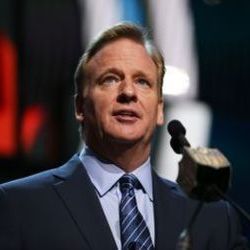NFL Commissioner Roger Goodell plans to brief owners on sports gambling at the league’s annual offseason meeting this week. Daniel Kaplan of Sports Business Journal said it was still uncertain if the NFL would take a position on legal sports betting.
At the moment, all the other major sports leagues have shown some willingness to accept legal sports betting, but Roger Goodell maintains the league’s decades-long hardline position on the matter. A recent sports betting bill which passed a committee vote in the New York Senate has the potential to change that position.
Last week, New York State Sen. John Bonacic sponsored a sports gambling and online poker bill which would provide monetary compensation from sports betting revenues generated by bets on games involving US sports leagues. The 0.25% revenue on turnover might not sound like much, but the American Gaming Association estimates that US gamblers bet $200 billion a year on sports.
Proposed .25% Integrity Fee
One-fourth of 1% would represent an additional $500 million a year in revenues for the NFL, if Bonacic’s revenue was made a part of a federally-approved legal sports betting system. The US Supreme Court currently deliberates on the constitutionality of the 1992 PASPA law, which bans sports betting in 46 states (and full sportsbooks in all states but Nevada).
For decades, Roger Goodell and his predecessors in the NFL League Office have supported a ban on sports betting, due to concerns over “the integrity of the game”. In a time when unregulated offshore bookmaker sites and live/in-play mobile smartphone betting allows any American to bet on sports with a few clicks, that position no longer seems tenable.
NBA Commissioner Adam Silver has called for legal and licensed sports betting which would be regulated at the federal level. MLB’s Rob Manfred and the NHL’s Gary Bettman each have signalled they would listen to reasonable solutions, if they were presented. The questions therefore are whether America’s highest-dollar sports league will give its approval and what a new system might look like.
Possible 1% Intellectual Property Fee
One extreme solution would be to get a large cut of sports betting by arguing that bookmakers and sports bettors use the National Football League’s “intellectual property” to make a profit. Adam Silver recently floated a version of that argument in a public speech recently.
At the time, he suggested a 1% licensing fee — something which brought a collective moan from the Nevada sportsbooks. The big Las Vegas bookmakers claim a fee that high would put them out of business, because they could not compete with the betting lines that unregulated (and untaxed) bookmaker sites could offer.
NFL Owner: Revenues from “Something We’re Creating”
One league owner seems to buy the intellectual property argument. An anonymous NFL owner told the Wall Street Journal recently, “Why would we let other people have all the benefit of something we’re creating?”
Murphy vs. NCAA Sports Betting Case
Most do not expect a clear decision from Commissioner Goodell or a defining vote by the assembly of owners this week. Experts believe the NFL will not state a public decision until a current US Supreme Court case, Murphy vs. NCAA*, is decided.
The Supreme Court will not rule on the New Jersey sports betting case until April 2 at the earlier. The decision might be months away, especially given that the current SCOTUS has been slower in the past year in deciding cases and just had its smallest case load in years.
NFL Briefs Owners on Sports Gambling
Once a decision is made by the SCOTUS, one of two things is likely to happen. If the Supreme Court rules against New Jersey (and legal sports betting), then the status quo will continue. Sportsbooks will be banned everywhere but Nevada.
If the SCOTUS rules in New Jersey‘s favor, then all of the leagues, including the NFL, will need to craft a policy quickly. In the waning months of his administration, Chris Christie said that New Jersey would be ready to launch land-based sportsbooks in summer 2018 — in time for the next NFL season — if the Supreme Court struck down the PASPA federal ban on sports gambling.
With that prospect possibly months away, NFL Commissioner Roger Goodell and the NFL league owners will need a policy in place. The question is whether the NFL settles for a 0.25% “integrity fee” on sports betting or a 1% or more “intellectual property” fee.
*Note: Previously, the case was Christie vs. NCAA, because the State of New Jersey is involved and its governor’s name is attached to the case.

